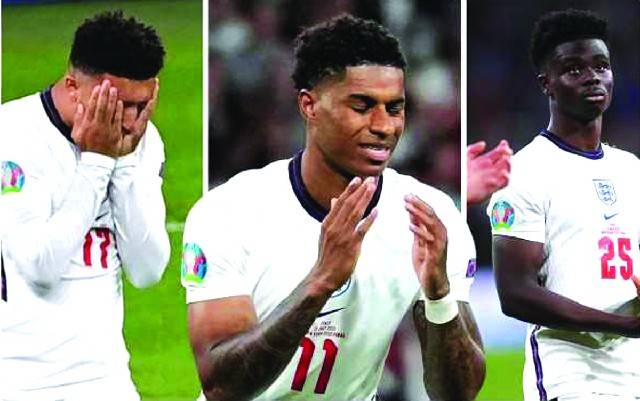
After England lost in the 2020 UEFA European Football Championship, online abuse was directed at Bukayo Saka, Marcus Rashford and Jadon Sancho who missed their penalty kicks in the final shootout. The England Football Association, FIFA, London’s Metropolitan Police, Prime Minister Boris Johnson and Prince William were among those who issued statements in solidarity and condemned the reckless online behavior of racist trolls.
In an Instagram post, Sir Lewis Hamilton, seven-time Formula 1 world champion, voiced his condemnation of the attacks and the underlying issues faced by minorities in sport: “The pressure to deliver is felt by every sports person but when you are a minority representing your country, this is a layered experience. Success would feel like a double victory, but a miss feels like a two-fold failure when it is compounded with racist abuse…We must work towards a society that doesn’t require black players to prove their value or place in society only through victory.”
Twitter reportedly removed more than 1,000 tweets and permanently suspended accounts that directed abuse at the England players, as did Facebook and Instagram. A real estate service provider suspended an employee as they looked into racist tweets and a right-wing political commentator and comedian also faced scrutiny following their comments. But despite this outpouring of support, there is still much to be done to address the larger societal issues of racism and create safe digital spaces. More needs to be done to tackle the issue of online racist abuse, not just when it targets British football players; but when it targets anyone, anywhere.
This is not the first time fans have turned to social media platforms or displayed abhorrent behavior related to sporting outcomes. Sports have been at the center of stories about racial profiling and discrimination at all levels. For example, during and before the Euro 2020, the England team kneeled before kick-off in solidarity against racism and inequality while some fans booed at this gesture. In addition, Rashford, who has helped British schools tackle child hunger, has constantly highlighted the racist abuse that continues to be directed towards him.

Countries have taken different approaches to the legality of hate speech, and many have called for new legislation to be able to hold perpetrators to account for their comments. Human rights experts point out that speech should not impede on the human rights of others; targeted harassment is designed to silence or cause victims to self-censor. Therefore, unabridged speech without regard to harm can actually suppress speech, particularly for vulnerable groups.
Even worse, this speech and the ideology that leads to this expression can fuel attacks on immigrants and other minorities as was seen in the Christchurch terrorist attack, and closer to home, the killings of our own minorities. Combating hate speech and online racial abuse based on characteristics such as race, gender and other identity characteristics is a fundamental step in stopping this violence.
When it comes to harmful content, there is currently no industry wide accepted measure of user safety on digital platforms. Measures such as “prevalence”, defined by one product as user views of harmful content as a proportion of all views, does not reflect the nuance that certain groups, based on their gender, race, ethnicity and other factors, may be more exposed to harmful content. In addition, more emphasis needs to be placed on “Safety By Design” so that tackling abuse and harm is a forethought rather than an afterthought.
While efforts are underway to address online safety in different regions, there is more to be done at a global level to help address all forms of abuse and harmful content online. Effective regulatory frameworks to moderate data and content across social media platforms are required, as well as better education and awareness of the benefits of a more diverse and inclusive environment for society. The recently launched Global Coalition for Digital Safety aims to drive forward work to address these issues.
Sports organizations have a unique opportunity to influence, educate, and express positive views given their emotional connection to fans, doing so in a way that bridges rather than exacerbates divides. You are not a “fan” if all you are good at is fanning the flames of hatred; you do not love sport if you cannot understand that there will be losses to face. There are so few things in the world that are left which unite us; let us stop looking for reasons to further divisions based solely on hate and ignorance, both domestically and internationally.
In an Instagram post, Sir Lewis Hamilton, seven-time Formula 1 world champion, voiced his condemnation of the attacks and the underlying issues faced by minorities in sport: “The pressure to deliver is felt by every sports person but when you are a minority representing your country, this is a layered experience. Success would feel like a double victory, but a miss feels like a two-fold failure when it is compounded with racist abuse…We must work towards a society that doesn’t require black players to prove their value or place in society only through victory.”
Twitter reportedly removed more than 1,000 tweets and permanently suspended accounts that directed abuse at the England players, as did Facebook and Instagram. A real estate service provider suspended an employee as they looked into racist tweets and a right-wing political commentator and comedian also faced scrutiny following their comments. But despite this outpouring of support, there is still much to be done to address the larger societal issues of racism and create safe digital spaces. More needs to be done to tackle the issue of online racist abuse, not just when it targets British football players; but when it targets anyone, anywhere.
Effective regulatory frameworks to moderate data and content across social media platforms are required
This is not the first time fans have turned to social media platforms or displayed abhorrent behavior related to sporting outcomes. Sports have been at the center of stories about racial profiling and discrimination at all levels. For example, during and before the Euro 2020, the England team kneeled before kick-off in solidarity against racism and inequality while some fans booed at this gesture. In addition, Rashford, who has helped British schools tackle child hunger, has constantly highlighted the racist abuse that continues to be directed towards him.

Countries have taken different approaches to the legality of hate speech, and many have called for new legislation to be able to hold perpetrators to account for their comments. Human rights experts point out that speech should not impede on the human rights of others; targeted harassment is designed to silence or cause victims to self-censor. Therefore, unabridged speech without regard to harm can actually suppress speech, particularly for vulnerable groups.
Even worse, this speech and the ideology that leads to this expression can fuel attacks on immigrants and other minorities as was seen in the Christchurch terrorist attack, and closer to home, the killings of our own minorities. Combating hate speech and online racial abuse based on characteristics such as race, gender and other identity characteristics is a fundamental step in stopping this violence.
When it comes to harmful content, there is currently no industry wide accepted measure of user safety on digital platforms. Measures such as “prevalence”, defined by one product as user views of harmful content as a proportion of all views, does not reflect the nuance that certain groups, based on their gender, race, ethnicity and other factors, may be more exposed to harmful content. In addition, more emphasis needs to be placed on “Safety By Design” so that tackling abuse and harm is a forethought rather than an afterthought.
While efforts are underway to address online safety in different regions, there is more to be done at a global level to help address all forms of abuse and harmful content online. Effective regulatory frameworks to moderate data and content across social media platforms are required, as well as better education and awareness of the benefits of a more diverse and inclusive environment for society. The recently launched Global Coalition for Digital Safety aims to drive forward work to address these issues.
Sports organizations have a unique opportunity to influence, educate, and express positive views given their emotional connection to fans, doing so in a way that bridges rather than exacerbates divides. You are not a “fan” if all you are good at is fanning the flames of hatred; you do not love sport if you cannot understand that there will be losses to face. There are so few things in the world that are left which unite us; let us stop looking for reasons to further divisions based solely on hate and ignorance, both domestically and internationally.

